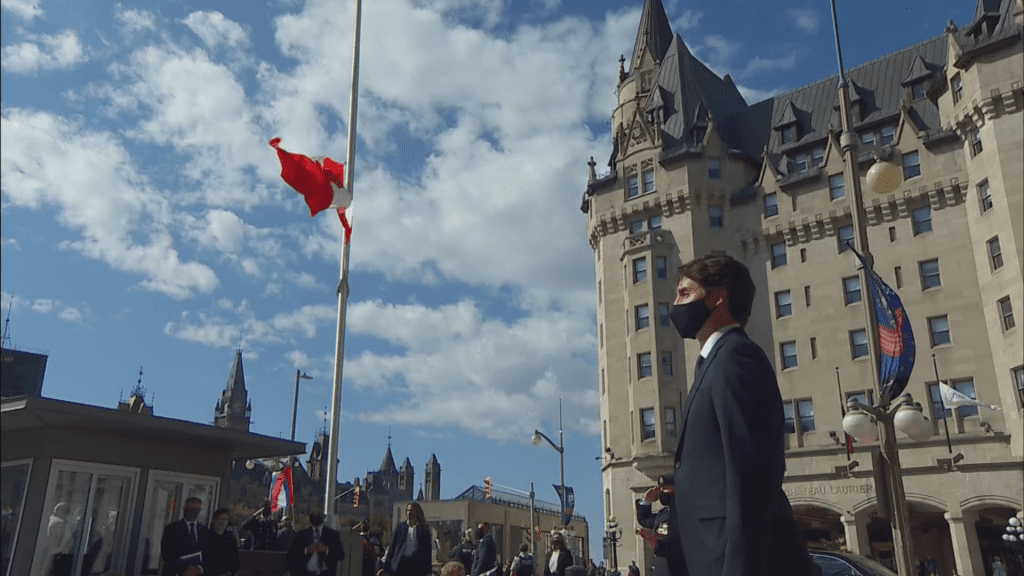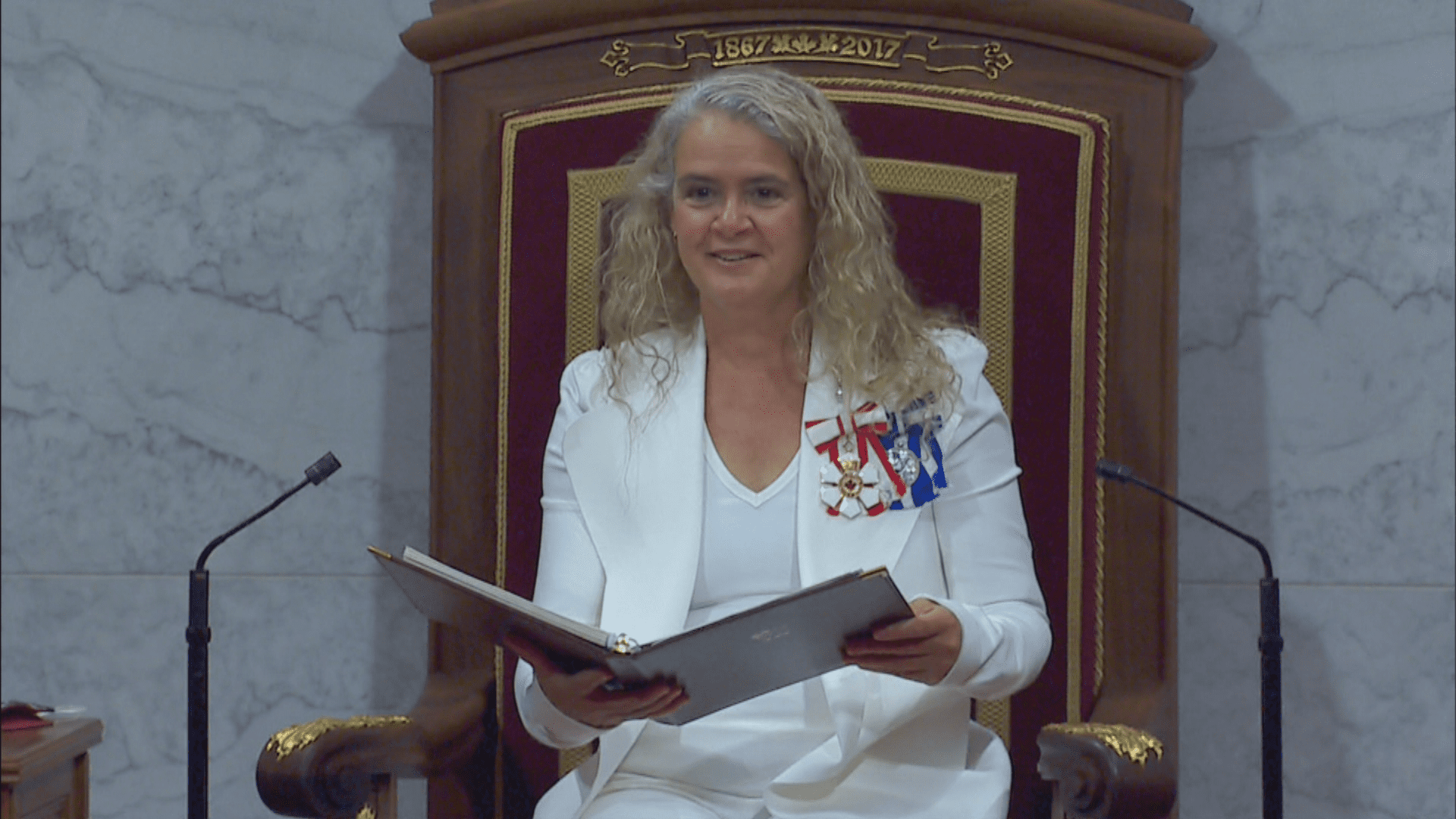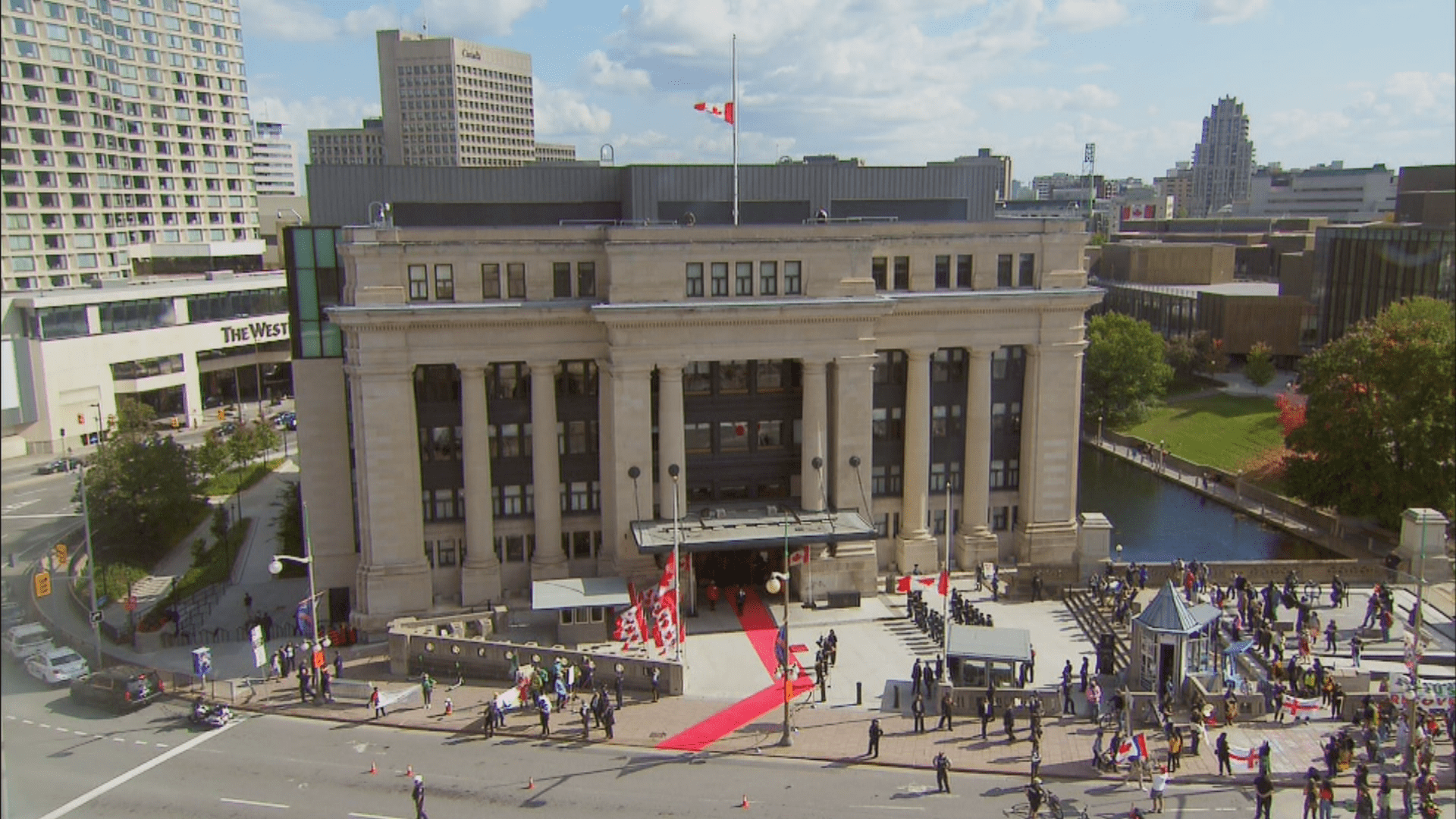
The federal government’s Throne Speech laid out a four-pronged approach for battling COVID-19 as cases surge in multiple jurisdictions across the country. File photo
It was a throne speech unlike any other – one defined by pandemic safety measures and almost totally focused on fighting the deadly virus that’s impacted the planet, taken more than 9,000 Canadian lives and wrought havoc on the economy.
Written by the federal government and delivered by the governor general, the throne speech unveiled Justin Trudeau’s legislative priorities as his minority government sits for a second session after a weeks-long prorogation of Parliament.
The government laid out a four-pronged approach to battling COVID-19 as cases surge in multiple jurisdictions across the country.
Ottawa also reiterated familiar promises on core issues impacting Indigenous people.
“This pandemic has been hard for everyone. But for those who were already struggling, the burden has been even heavier,” Julie Payette, after removing her mask, said in French.
This includes Indigenous people who face systemic barriers in Canada, said Payette.
The public health crisis brought several issues to the fore, such as a lack of primary care on-reserves, lack of data for Indigenous people living in cities and lack of critical infrastructure such as housing and potable water.
Read More:
First Nations doctors speak out on Canada’s ‘troublesome’ pandemic response
Ottawa promised to work with First Nations, Metis and Inuit organizations to develop what government calls “distinctions based Indigenous health legislation,” accelerate a 10-year commitment to close the infrastructure gap, and invest in its commitment to supply clean water to First Nations.
Promises issued in 2019’s throne speech surfaced again as well.
Ottawa promised to introduce legislation to implement the UN Declaration on the Rights of Indigenous Peoples before the end of 2020.
A private member’s bill to align Canada’s laws with UNDRIP died in the Senate last year shortly after it was introduced by former NDP MP Romeo Saganash.

Indigenous women and COVID-19
The Liberals also promise to accelerate work on a national action plan to address the crisis of missing and murdered Indigenous women in Canada – dubbed a genocide by the national inquiry that investigated it.
Opposing politicians and the inquiry’s former chief commissioner criticized the government for failing to deliver the touted action plan on June 3 as promised. Ministers pointed to pandemic-related delays.
The speech noted that women and youth in particular have borne a heavy burden throughout the pandemic’s first wave.
Indigenous women’s advocacy organizations began lobbying the government weeks in advance.
The Native Women’s Association of Canada (NWAC) said President Lorraine Whitman urged Ottawa to “place the well-being of Indigenous women” near the top of legislative agenda.
Pauktuutit, the national Inuit women’s organization, said it hoped to see immediate support for Inuit women and children in the form of $20 million for shelters and transitional housing.
Payette said Ottawa will invest in infrastructure such as public transit, affordable housing and broadband – especially for Indigenous and northern communities.
The government also promised to work with First Nations, Metis and Inuit to address food insecurity and strengthen food supply chains.
There were few other commitments to the North.
Addressing systemic racism
As pandemic lockdowns eased, Canada was rocked by anti-racism demonstrations, protests against policy brutality, and wide-spread calls for police reform.
The movement was sparked by the police killing of an unarmed Black man in the United States, but a spate of police violence against Indigenous people also shook things up north of the medicine line.
Chantel Moore and Rodney Levi were shot and killed by police, Athabasca Chipewyan Chief Allan Adam faced a violent arrest at the hands of the RCMP over an expired license place and an Inuk-man was struck down by the door of a moving police vehicle, among other high-profile incidents.
Ottawa promised to spearhead systemic racism and reform the federal police service.
“The government,” said Payette, “will take steps to ensure that the strong hand of criminal justice is used where it is needed to keep people safe, but not where it would be discriminatory or counterproductive.”
This includes legislation to address inequities in the criminal justice system at all stages, advancing civilian oversight of the RCMP, modernizing police training, addressing national standards on use of force, and shifting toward community-led policing through RCMP reform.
Government also reiterated a 2019 mandate to develop legislation making First Nations policing an essential service.
There were also environmental commitments to reach a “net zero” emissions future. This includes modernizing the Environmental Protection Act and pushing forward with a carbon tax.

The Assembly of First Nations noted that the speech upheld 2019 commitments.
National Chief Perry Bellegarde said that several priorities were things AFN lobbied for. But lobbying continues to make sure issues facing First Nations aren’t put on the back burner.
“It’s our job at the Assembly of First Nations to ensure that those high-level priorities that are espoused in this throne speech are now reflected in the mandate letters and in the federal budget,” he told reporters.
“The work begins now of lobbying, advocacy, talking to as many ministers and deputy ministers and chiefs of staff, everybody that we can to influence this next cycle.”
Asked if government left anything out, Bellegarde said that mechanisms for treaty implementation were mentioned in 2019 but not this year.
He pointed to the ongoing conflict in Nova Scotia over Mi’kmaw treaty rights to fish for a moderate livelihood as evidence the issue needs to be addressed.
“That was something that wasn’t specifically mentioned, but I’m going to put that into building on 2019 commitments,” he said.
Four priorities
Ottawa’s first priority, however, is to fight the pandemic.
Next, they promise to support people and businesses with whatever “fiscal firepower is needed.”
The Liberals’ third priority will be engineering an economic rebound. The novel coronavirus cratered the economy with a deficit projected to be the largest since the Second World War and impacts worse than the 2008 financial crisis.
The fourth and final pillar of the new legislative agenda includes walking “the road of reconciliation,” combatting discrimination, defending Canadian values and working toward gender equality.
“This is our generation’s crossroads,” Payette said Wednesday. “Do we move Canada forward, or let people be left behind?”









